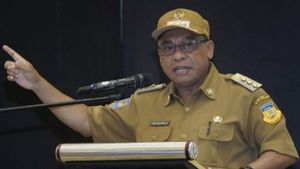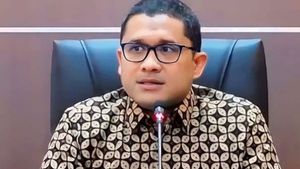JAKARTA Carut-marut the condition of teachers in Indonesia continues to be in the public spotlight, even changing the rules to the curriculum has not had a significant impact. One of the issues that are still happening is the issue of honorary teachers, as felt by Andriyawati (45), an honorary teacher at SDN 6 Wawanii Barat, Wawanii Island, Konawe Islands Regency, Southeast Sulawesi.
Currently, he is in the process of being appointed as a Civil Servant (PNS). Guru Ati, as he is known, has devoted himself to 17 years as an honorary teacher to educate the younger generation in Wawanii.
Guru Ati's hopes for his students have never been extinguished. He continues to try to provide the best teaching for the 50 students he is good at. However, the damaged school conditions are a challenge for him. Sometimes, students are forced to study in the library room or join other classes. Not to mention the journey to the school that Guru Ati had to take, through a steep and long path, especially during the rainy season. However, his enthusiasm to educate his students never recedes.
Seeing various complaints from honorary teachers, the Director of Advocacy for IDEAS Policy, Agung Pardini, emphasized that the state was not yet fully present to provide proper welfare for honorary teachers. In fact, Law no. 20 of 2003 concerning the National Education System and Law No. 14 of 2005 concerning Teachers and Lecturers have regulated the right to decent income for teachers.
"Of the 3.7 million teachers in Indonesia, 2.06 million or 56 percent are honorary or non-permanent teachers. Most of them still receive wages that are far from feasible, even in some areas there are still many that are below Rp. 500 thousand, especially at the elementary and MI levels," said Agung Pardini in his presentation. Between Heritage, Tuesday (26/11).
SEE ALSO:
Agung explained that the source of salaries for honorary teachers is still dependent on the School Operational Assistance Fund (BOS). Based on regulations, the allocation of honorary teachers' salaries from BOS funds is a maximum of 50 percent for schools under the Ministry of Education and Culture and 60 percent for schools under the Ministry of Religion.
"The IDEAS simulation reveals that the average salary of honorary teachers supported by BOS funds is only between Rp. 780 thousand to Rp. 3.3 million, depending on the level of education," said Agung.
At the national level, elementary school honorary teachers receive an average salary of IDR 1.2 million, while junior high school teachers get IDR 1.9 million. At the secondary education level, high school honorary teachers are paid an average of IDR 2.7 million, and vocational school teachers IDR 3.3 million.
"However, the condition of madrasah teachers is far more concerning, with an average salary of only Rp. 780 thousand for Madrasah Ibtidaiyah (MI), Rp. 785 thousand for Madrasah Tsanawiyah (MTs), and Rp. 984 thousand for Madrasah Aliyah (MA)," said Agung.
Agung said that the small ratio of teachers and students, especially in certain areas, was one of the reasons why the BOS Fund allocation was insufficient to provide decent salaries for honorary teachers.
"Even if the portion of the BOS Fund is increased by more than 60 percent, it will still not be enough to achieve a decent welfare," he said.
Meanwhile, Dian Mulyadi, Deputy Director of Corporate Secretary of Dompet Dhuafa, said, The role of teachers is very important to optimize learning models. However, the responsibility to educate the nation is not only the task of teachers, but it is our common task. We hope that teachers will continue to be enthusiastic about creating the next generation of nations who have noble characters.
Lukman Solihin, Policy Analyst from the Center for Standards and Education Policies (PSKP) of the Ministry of Basic and Secondary Education (Kemendikdasmen), in the discussion 'Proud to Be a Teacher?', said, 'It's time for teacher teaching skills to be improved, by having a growth mindset and adaptive attitude, because this ability is proven to be correlated with the strengthening of teacher competence and the achievement of student learning results.
On the other hand, Heni Kurniasih, Secretary of the SMERU Institute, revealed, Teachers are one of the main actors who determine the quality of education and student achievements. However, the quality of teachers needs to be improved through coherent policies such as teacher career development, teacher professional education, teacher placement, and teacher professionalism development.
This is in line with the action of GREAT Edunesia. Asep Hendriana, CEO of GREAT Edunesia, explained, GREAT Edunesia invites the public to restore the pride of a teacher, so that the teaching profession returns to a noble profession. Because teachers are not just being hailed and imitated. We must respect their struggle to educate millions of children of the nation, including candidates for regional leaders in the future.
The English, Chinese, Japanese, Arabic, and French versions are automatically generated by the AI. So there may still be inaccuracies in translating, please always see Indonesian as our main language. (system supported by DigitalSiber.id)
















